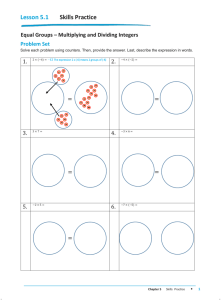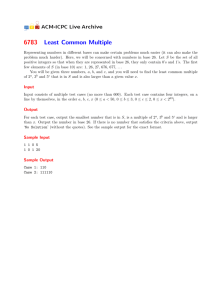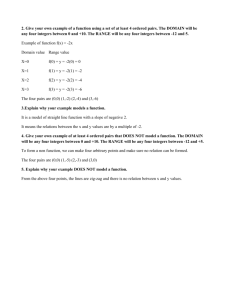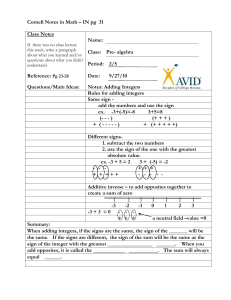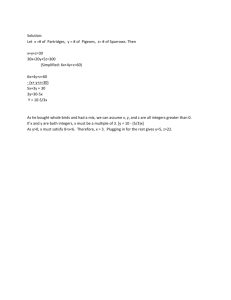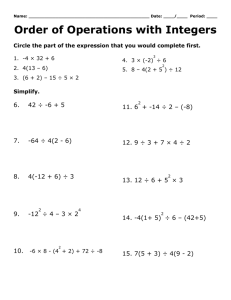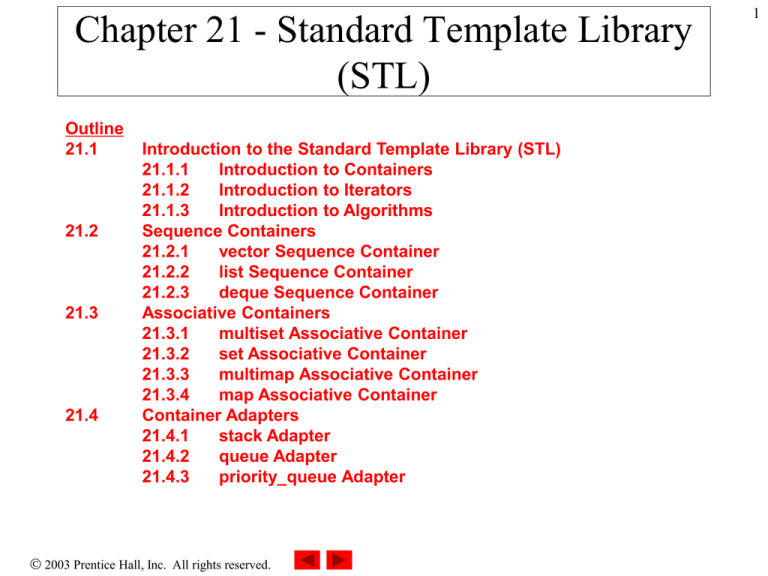
Chapter 21 - Standard Template Library
(STL)
Outline
21.1
21.2
21.3
21.4
Introduction to the Standard Template Library (STL)
21.1.1
Introduction to Containers
21.1.2
Introduction to Iterators
21.1.3
Introduction to Algorithms
Sequence Containers
21.2.1
vector Sequence Container
21.2.2
list Sequence Container
21.2.3
deque Sequence Container
Associative Containers
21.3.1
multiset Associative Container
21.3.2
set Associative Container
21.3.3
multimap Associative Container
21.3.4
map Associative Container
Container Adapters
21.4.1
stack Adapter
21.4.2
queue Adapter
21.4.3
priority_queue Adapter
2003 Prentice Hall, Inc. All rights reserved.
1
Chapter 21 - Standard Template Library
(STL)
21.5
21.6
21.7
Algorithms
21.5.1
fill, fill_n, generate and generate_n
21.5.2
equal, mismatch and lexicographical_compare
21.5.3
remove, remove_if, remove_copy and remove_copy_if
21.5.4
replace, replace_if, replace_copy and replace_copy_if
21.5.5
Mathematical Algorithms
21.5.6
Basic Searching and Sorting Algorithms
21.5.7
swap, iter_swap and swap_ranges
21.5.8
copy_backward, merge, unique and reverse
21.5.9
inplace_merge, unique_copy and reverse_copy
21.5.10 Set Operations
21.5.11 lower_bound, upper_bound and equal_range
21.5.12 Heapsort
21.5.13 min and max
21.5.14 Algorithms Not Covered in This Chapter
Class bitset
Function Objects
2003 Prentice Hall, Inc. All rights reserved.
2
3
21.1 Introduction to the Standard Template
Library (STL)
• STL
– Powerful, template-based components
• Containers: template data structures
• Iterators: like pointers, access elements of containers
• Algorithms: data manipulation, searching, sorting, etc.
– Object- oriented programming: reuse, reuse, reuse
– Only an introduction to STL, a huge class library
2003 Prentice Hall, Inc. All rights reserved.
4
21.1.1 Introduction to Containers
• Three types of containers
– Sequence containers
• Linear data structures (vectors, linked lists)
• First-class container
– Associative containers
• Non-linear, can find elements quickly
• Key/value pairs
• First-class container
– Container adapters
• Near containers
– Similar to containers, with reduced functionality
• Containers have some common functions
2003 Prentice Hall, Inc. All rights reserved.
5
STL Container Classes (Fig. 21.1)
• Sequence containers
– vector
– deque
– list
• Associative containers
–
–
–
–
set
multiset
map
multimap
• Container adapters
– stack
– queue
– priority_queue
2003 Prentice Hall, Inc. All rights reserved.
6
Common STL Member Functions (Fig. 21.2)
• Member functions for all containers
–
–
–
–
–
Default constructor, copy constructor, destructor
empty
max_size, size
= < <= > >= == !=
swap
• Functions for first-class containers
– begin, end
– rbegin, rend
– erase, clear
2003 Prentice Hall, Inc. All rights reserved.
7
Common STL typedefs (Fig. 21.4)
• typedefs for first-class containers
–
–
–
–
–
–
–
–
–
–
value_type
reference
const_reference
pointer
iterator
const_iterator
reverse_iterator
const_reverse_iterator
difference_type
size_type
2003 Prentice Hall, Inc. All rights reserved.
8
21.1.2 Introduction to Iterators
• Iterators similar to pointers
– Point to first element in a container
– Iterator operators same for all containers
• * dereferences
• ++ points to next element
• begin() returns iterator to first element
• end() returns iterator past last element
– Use iterators with sequences (ranges)
• Containers
• Input sequences: istream_iterator
• Output sequences: ostream_iterator
2003 Prentice Hall, Inc. All rights reserved.
9
21.1.2 Introduction to Iterators
• Usage
– std::istream_iterator< int > inputInt( cin )
• Can read input from cin
• *inputInt
– Dereference to read first int from cin
• ++inputInt
– Go to next int in stream
– std::ostream_iterator< int > outputInt(cout)
• Can output ints to cout
• *outputInt = 7
– Outputs 7 to cout
• ++outputInt
– Advances iterator so we can output next int
2003 Prentice Hall, Inc. All rights reserved.
1
2
3
4
5
6
7
8
9
10
11
12
13
14
15
16
17
18
19
20
21
// Fig. 21.5: fig21_05.cpp
// Demonstrating input and output with iterators.
#include <iostream>
int main()
{
cout << "Enter two
Outline
fig21_05.cpp
(1 of 2)
using std::cout;
using std::cin;
using std::endl;
#include <iterator>
10
Note creation of
istream_iterator. For
compilation reasons, we use
std:: rather than a using
integers:
";
statement.
// ostream_iterator and istream_iterator
// create istream_iterator for reading int values from cin
std::istream_iterator< int > inputInt( cin );
Access and assign the iterator
like a pointer.
int number1 = *inputInt; // read int from standard input
++inputInt;
// move iterator to next input value
int number2 = *inputInt; // read int from standard input
2003 Prentice Hall, Inc.
All rights reserved.
22
23
24
25
26
27
28
29
30
31
// create ostream_iterator for writing int values to cout
std::ostream_iterator< int > outputInt( cout );
cout << "The sum is: ";
*outputInt = number1 + number2;
cout << endl;
// output result to cout
11
Outline
fig21_05.cpp
(2 of 2)
fig21_05.cpp
output (1 of 1)
return 0;
} // end main
Enter two integers: 12 25
The sum is: 37
Create an
ostream_iterator is
similar. Assigning to this
iterator outputs to cout.
2003 Prentice Hall, Inc.
All rights reserved.
12
Iterator Categories (Fig. 21.6)
• Input
– Read elements from container, can only move forward
• Output
– Write elements to container, only forward
• Forward
– Combines input and output, retains position
– Multi-pass (can pass through sequence twice)
• Bidirectional
– Like forward, but can move backwards as well
• Random access
– Like bidirectional, but can also jump to any element
2003 Prentice Hall, Inc. All rights reserved.
13
Iterator Types Supported (Fig. 21.8)
• Sequence containers
– vector: random access
– deque: random access
– list: bidirectional
• Associative containers (all bidirectional)
–
–
–
–
set
multiset
Map
multimap
• Container adapters (no iterators supported)
– stack
– queue
– priority_queue
2003 Prentice Hall, Inc. All rights reserved.
14
Iterator Operations (Fig. 21.10)
• All
– ++p, p++
• Input iterators
– *p
– p = p1
– p == p1, p != p1
• Output iterators
– *p
– p = p1
• Forward iterators
– Have functionality of input and output iterators
2003 Prentice Hall, Inc. All rights reserved.
15
Iterator Operations (Fig. 21.10)
• Bidirectional
– --p, p--
• Random access
–
–
–
–
–
p + i, p += i
p - i, p -= i
p[i]
p < p1, p <= p1
p > p1, p >= p1
2003 Prentice Hall, Inc. All rights reserved.
16
21.1.3 Introduction to Algorithms
• STL has algorithms used generically across
containers
– Operate on elements indirectly via iterators
– Often operate on sequences of elements
• Defined by pairs of iterators
• First and last element
– Algorithms often return iterators
• find()
• Returns iterator to element, or end() if not found
– Premade algorithms save programmers time and effort
2003 Prentice Hall, Inc. All rights reserved.
17
21.2 Sequence Containers
• Three sequence containers
– vector - based on arrays
– deque - based on arrays
– list - robust linked list
2003 Prentice Hall, Inc. All rights reserved.
18
21.2.1 vector Sequence Container
• vector
– <vector>
– Data structure with contiguous memory locations
• Access elements with []
– Use when data must be sorted and easily accessible
• When memory exhausted
– Allocates larger, contiguous area of memory
– Copies itself there
– Deallocates old memory
• Has random access iterators
2003 Prentice Hall, Inc. All rights reserved.
19
21.2.1 vector Sequence Container
• Declarations
– std::vector <type> v;
• type: int, float, etc.
• Iterators
– std::vector<type>::const_iterator iterVar;
• const_iterator cannot modify elements
– std::vector<type>::reverse_iterator iterVar;
• Visits elements in reverse order (end to beginning)
• Use rbegin to get starting point
• Use rend to get ending point
2003 Prentice Hall, Inc. All rights reserved.
20
21.2.1 vector Sequence Container
• vector functions
– v.push_back(value)
• Add element to end (found in all sequence containers).
– v.size()
• Current size of vector
– v.capacity()
• How much vector can hold before reallocating memory
• Reallocation doubles size
– vector<type> v(a, a + SIZE)
• Creates vector v with elements from array a up to (not including)
a + SIZE
2003 Prentice Hall, Inc. All rights reserved.
21
21.2.1 vector Sequence Container
• vector functions
– v.insert(iterator, value )
• Inserts value before location of iterator
– v.insert(iterator, array , array + SIZE)
• Inserts array elements (up to, but not including array + SIZE) into
vector
– v.erase( iterator )
• Remove element from container
– v.erase( iter1, iter2 )
• Remove elements starting from iter1 and up to (not including)
iter2
– v.clear()
• Erases entire container
2003 Prentice Hall, Inc. All rights reserved.
22
21.2.1 vector Sequence Container
• vector functions operations
– v.front(), v.back()
• Return first and last element
– v[elementNumber] = value;
• Assign value to an element
– v.at(elementNumber) = value;
• As above, with range checking
• out_of_bounds exception
2003 Prentice Hall, Inc. All rights reserved.
23
21.2.1 vector Sequence Container
• ostream_iterator
– std::ostream_iterator< type > Name(
outputStream, separator );
• type: outputs values of a certain type
• outputStream: iterator output location
• separator: character separating outputs
• Example
– std::ostream_iterator< int > output( cout, " " );
– std::copy( iterator1, iterator2, output );
• Copies elements from iterator1 up to (not including)
iterator2 to output, an ostream_iterator
2003 Prentice Hall, Inc. All rights reserved.
1
2
3
4
5
6
7
8
9
10
11
12
13
14
15
16
17
18
19
20
21
22
23
24
25
26
// Fig. 21.14: fig21_14.cpp
// Demonstrating standard library vector class template.
#include <iostream>
Outline
fig21_14.cpp
(1 of 3)
using std::cout;
using std::cin;
using std::endl;
#include <vector>
24
// vector class-template definition
// prototype for function template printVector
template < class T >
void printVector( const std::vector< T > &integers2 );
int main()
{
Create a
const int SIZE = 6;
int array[ SIZE ] = { 1, 2, 3, 4, 5, 6 };
std::vector< int > integers;
cout <<
<<
<<
<<
vector of ints.
Call member functions.
"The initial size of integers is: "
integers.size()
"\nThe initial capacity of integers is: "
integers.capacity();
2003 Prentice Hall, Inc.
All rights reserved.
27
28
29
30
31
32
33
34
35
36
37
38
39
40
41
42
43
44
45
// function push_back
integers.push_back( 2
integers.push_back( 3
integers.push_back( 4
is in every sequence collection
);
);
);
25
Add elements to end of Outline
vector using push_back.
cout << "\nThe size of integers is: " << integers.size()
<< "\nThe capacity of integers is: "
<< integers.capacity();
fig21_14.cpp
(2 of 3)
cout << "\n\nOutput array using pointer notation: ";
for ( int *ptr = array; ptr != array + SIZE; ++ptr )
cout << *ptr << ' ';
cout << "\nOutput vector using iterator notation: ";
printVector( integers );
cout << "\nReversed contents of vector integers: ";
2003 Prentice Hall, Inc.
All rights reserved.
46
47
48
49
50
51
52
53
54
55
56
57
58
59
60
61
62
63
64
65
66
67
68
69
70
26
std::vector< int >::reverse_iterator reverseIterator;
for ( reverseIterator = integers.rbegin();
reverseIterator!= integers.rend();
++reverseIterator )
cout << *reverseIterator << ' ';
Outline
Walk through vector
fig21_14.cpp
backwards using (3
a of 3)
reverse_iterator.
cout << endl;
return 0;
} // end main
// function template for outputting vector elements
template < class T >
void printVector( const std::vector< T > &integers2 )
{
std::vector< T >::const_iterator constIterator;
Template function to walk
through vector forwards.
for ( constIterator = integers2.begin();
constIterator != integers2.end();
constIterator++ )
cout << *constIterator << ' ';
} // end function printVector
2003 Prentice Hall, Inc.
All rights reserved.
The
The
The
The
initial size of v is: 0
initial capacity of v is: 0
size of v is: 3
capacity of v is: 4
Contents of array a using pointer notation: 1 2 3 4 5 6
Contents of vector v using iterator notation: 2 3 4
Reversed contents of vector v: 4 3 2
27
Outline
fig21_14.cpp
output (1 of 1)
2003 Prentice Hall, Inc.
All rights reserved.
1
2
3
4
5
6
7
8
9
10
11
12
13
14
15
16
17
18
19
20
21
22
23
24
25
28
// Fig. 21.15: fig21_15.cpp
// Testing Standard Library vector class template
// element-manipulation functions.
#include <iostream>
Outline
fig21_15.cpp
(1 of 3)
using std::cout;
using std::endl;
#include <vector>
#include <algorithm>
// vector class-template definition
// copy algorithm
int main()
{
const int SIZE = 6;
int array[ SIZE ] = { 1, 2, 3, 4, 5, 6 };
std::vector< int > integers( array, array + SIZE );
std::ostream_iterator< int > output( cout, " " );
Create vector (initialized
using an array) and
ostream_iterator.
Copy range of iterators to output
(ostream_iterator).
cout << "Vector integers contains: ";
std::copy( integers.begin(), integers.end(), output );
cout << "\nFirst element of integers: " << integers.front()
<< "\nLast element of integers: " << integers.back();
2003 Prentice Hall, Inc.
All rights reserved.
26
27
28
29
30
31
32
33
34
35
36
37
38
39
40
41
42
43
44
45
46
47
48
49
50
51
integers[ 0 ] = 7;
integers.at( 2 ) = 10;
// set first element to 7
// set element at position 2 to 10
// insert 22 as 2nd element
integers.insert( integers.begin() + 1, 22 );
29
Outline
More vector member
fig21_15.cpp
functions.
(2 of 3)
cout << "\n\nContents of vector integers after changes: ";
std::copy( integers.begin(), integers.end(), output );
// access out-of-range element
try {
integers.at( 100 ) = 777;
at has range checking, and
can throw an exception.
} // end try
// catch out_of_range exception
catch ( std::out_of_range outOfRange ) {
cout << "\n\nException: " << outOfRange.what();
} // end catch
// erase first element
integers.erase( integers.begin() );
cout << "\n\nVector integers after erasing first element: ";
std::copy( integers.begin(), integers.end(), output );
2003 Prentice Hall, Inc.
All rights reserved.
52
53
54
55
56
57
58
59
60
61
62
63
64
65
66
67
68
69
70
71
// erase remaining elements
integers.erase( integers.begin(), integers.end() );
cout << "\nAfter erasing all elements, vector integers "
<< ( integers.empty() ? "is" : "is not" ) << " empty";
// insert elements from array
integers.insert( integers.begin(), array, array + SIZE );
cout << "\n\nContents of vector integers before clear: ";
std::copy( integers.begin(), integers.end(), output );
30
Outline
fig21_15.cpp
(3 of 3)
// empty integers; clear calls erase to empty a collection
integers.clear();
cout << "\nAfter clear, vector integers "
<< ( integers.empty() ? "is" : "is not" ) << " empty";
cout << endl;
return 0;
} // end main
2003 Prentice Hall, Inc.
All rights reserved.
Vector integers contains: 1 2 3 4 5 6
First element of integers: 1
Last element of integers: 6
Contents of vector integers after changes: 7 22 2 10 4 5 6
31
Outline
fig21_15.cpp
output (1 of 1)
Exception: invalid vector<T> subscript
Vector integers after erasing first element: 22 2 10 4 5 6
After erasing all elements, vector integers is empty
Contents of vector integers before clear: 1 2 3 4 5 6
After clear, vector integers is empty
2003 Prentice Hall, Inc.
All rights reserved.
32
21.2.2 list Sequence Container
• list container
– Header <list>
–
–
–
–
Efficient insertion/deletion anywhere in container
Doubly-linked list (two pointers per node)
Bidirectional iterators
std::list< type > name;
2003 Prentice Hall, Inc. All rights reserved.
33
21.2.2 list Sequence Container
• list functions for object t
– t.sort()
• Sorts in ascending order
– t.splice(iterator, otherObject );
• Inserts values from otherObject before iterator,
removes otherObject
– t.merge( otherObject )
• Removes otherObject and inserts it into t, sorted
– t.unique()
• Removes duplicate elements
2003 Prentice Hall, Inc. All rights reserved.
34
21.2.2 list Sequence Container
• list functions
– t.swap(otherObject);
• Exchange contents
– t.assign(iterator1, iterator2)
• Replaces contents with elements in range of iterators
– t.remove(value)
• Erases all instances of value
2003 Prentice Hall, Inc. All rights reserved.
1
2
3
4
5
6
7
8
9
10
11
12
13
14
15
16
17
18
19
20
21
22
23
24
25
26
27
// Fig. 21.17: fig21_17.cpp
// Standard library list class template test program.
#include <iostream>
Outline
fig21_17.cpp
(1 of 5)
using std::cout;
using std::endl;
#include <list>
#include <algorithm>
35
// list class-template definition
// copy algorithm
// prototype for function template printList
template < class T >
void printList( const std::list< T > &listRef );
int main()
{
const int SIZE = 4;
int array[ SIZE ] = { 2, 6, 4, 8 };
Create two list objects.
std::list< int > values;
std::list< int > otherValues;
// insert items in values
values.push_front( 1 );
values.push_front( 2 );
values.push_back( 4 );
values.push_back( 3 );
2003 Prentice Hall, Inc.
All rights reserved.
28
29
30
31
32
33
34
35
36
37
38
39
40
41
42
43
44
45
46
47
48
49
50
51
52
53
54
36
cout << "values contains: ";
printList( values );
values.sort();
Various list member
functions.
// sort values
Outline
fig21_17.cpp
(2 of 5)
cout << "\nvalues after sorting contains: ";
printList( values );
// insert elements of array into otherValues
otherValues.insert( otherValues.begin(),
array, array + SIZE );
cout << "\nAfter insert, otherValues contains: ";
printList( otherValues );
// remove otherValues elements and insert at end of values
values.splice( values.end(), otherValues );
cout << "\nAfter splice, values contains: ";
printList( values );
values.sort();
// sort values
cout << "\nAfter sort, values contains: ";
printList( values );
2003 Prentice Hall, Inc.
All rights reserved.
55
56
57
58
59
60
61
62
63
64
65
66
67
68
69
70
71
72
73
74
75
76
77
78
79
80
81
82
// insert elements of array into otherValues
otherValues.insert( otherValues.begin(),
array, array + SIZE );
otherValues.sort();
cout << "\nAfter insert, otherValues contains: ";
printList( otherValues );
37
Outline
fig21_17.cpp
(3 of 5)
// remove otherValues elements and insert into values
// in sorted order
values.merge( otherValues );
cout << "\nAfter merge:\n
values contains: ";
printList( values );
cout << "\n
otherValues contains: ";
printList( otherValues );
values.pop_front();
values.pop_back();
// remove element from front
// remove element from back
cout << "\nAfter pop_front and pop_back:"
<< "\n
values contains: ";
printList( values );
values.unique();
// remove duplicate elements
cout << "\nAfter unique, values contains: ";
printList( values );
2003 Prentice Hall, Inc.
All rights reserved.
83
84
85
86
87
88
89
90
91
92
93
94
95
96
97
98
99
100
101
102
103
104
105
106
107
108
38
// swap elements of values and otherValues
values.swap( otherValues );
cout << "\nAfter swap:\n
values contains: ";
printList( values );
cout << "\n
otherValues contains: ";
printList( otherValues );
Outline
fig21_17.cpp
(4 of 5)
// replace contents of values with elements of otherValues
values.assign( otherValues.begin(), otherValues.end() );
cout << "\nAfter assign, values contains: ";
printList( values );
// remove otherValues elements and insert into values
// in sorted order
values.merge( otherValues );
cout << "\nAfter merge, values contains: ";
printList( values );
values.remove( 4 );
// remove all 4s
cout << "\nAfter remove( 4 ), values contains: ";
printList( values );
2003 Prentice Hall, Inc.
All rights reserved.
109
110
111
112
113
114
115
116
117
118
119
120
121
122
123
124
125
126
127
128
129
130
39
cout << endl;
return 0;
} // end main
Outline
fig21_17.cpp
(5 of 5)
// printList function template definition; uses
// ostream_iterator and copy algorithm to output list elements
template < class T >
void printList( const std::list< T > &listRef )
{
if ( listRef.empty() )
cout << "List is empty";
else {
std::ostream_iterator< T > output( cout, " " );
std::copy( listRef.begin(), listRef.end(), output );
} // end else
} // end function printList
2003 Prentice Hall, Inc.
All rights reserved.
values contains: 2 1 4 3
values after sorting contains: 1 2 3 4
After insert, otherValues contains: 2 6 4 8
After splice, values contains: 1 2 3 4 2 6 4 8
After sort, values contains: 1 2 2 3 4 4 6 8
After insert, otherValues contains: 2 4 6 8
After merge:
values contains: 1 2 2 2 3 4 4 4 6 6 8 8
otherValues contains: List is empty
After pop_front and pop_back:
values contains: 2 2 2 3 4 4 4 6 6 8
After unique, values contains: 2 3 4 6 8
After swap:
values contains: List is empty
otherValues contains: 2 3 4 6 8
After assign, values contains: 2 3 4 6 8
After merge, values contains: 2 2 3 3 4 4 6 6 8 8
After remove( 4 ), values contains: 2 2 3 3 6 6 8 8
40
Outline
fig21_17.cpp
output (1 of 1)
2003 Prentice Hall, Inc.
All rights reserved.
41
21.2.3 deque Sequence Container
• deque ("deek"): double-ended queue
– Header <deque>
– Indexed access using []
– Efficient insertion/deletion in front and back
– Non-contiguous memory: has "smarter" iterators
• Same basic operations as vector
– Also has
• push_front (insert at front of deque)
• pop_front (delete from front)
2003 Prentice Hall, Inc. All rights reserved.
1
2
3
4
5
6
7
8
9
10
11
12
13
14
15
16
17
18
19
20
21
22
23
24
25
26
// Fig. 21.18: fig21_18.cpp
// Standard library class deque test program.
#include <iostream>
Outline
fig21_18.cpp
(1 of 2)
using std::cout;
using std::endl;
#include <deque>
#include <algorithm>
42
// deque class-template definition
// copy algorithm
Create a deque, use member
functions.
int main()
{
std::deque< double > values;
std::ostream_iterator< double > output( cout, " " );
// insert elements in values
values.push_front( 2.2 );
values.push_front( 3.5 );
values.push_back( 1.1 );
cout << "values contains: ";
// use subscript operator to obtain elements of values
for ( int i = 0; i < values.size(); ++i )
cout << values[ i ] << ' ';
2003 Prentice Hall, Inc.
All rights reserved.
27
28
29
30
31
32
33
34
35
36
37
38
39
40
41
42
values.pop_front();
// remove first element
cout << "\nAfter pop_front, values contains: ";
std::copy( values.begin(), values.end(), output );
// use subscript operator to modify element at location 1
values[ 1 ] = 5.4;
cout << "\nAfter values[ 1 ] = 5.4, values contains: ";
std::copy( values.begin(), values.end(), output );
43
Outline
fig21_18.cpp
(2 of 2)
fig21_18.cpp
output (1 of 1)
cout << endl;
return 0;
} // end main
values contains: 3.5 2.2 1.1
After pop_front, values contains: 2.2 1.1
After values[ 1 ] = 5.4, values contains: 2.2 5.4
2003 Prentice Hall, Inc.
All rights reserved.


